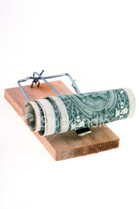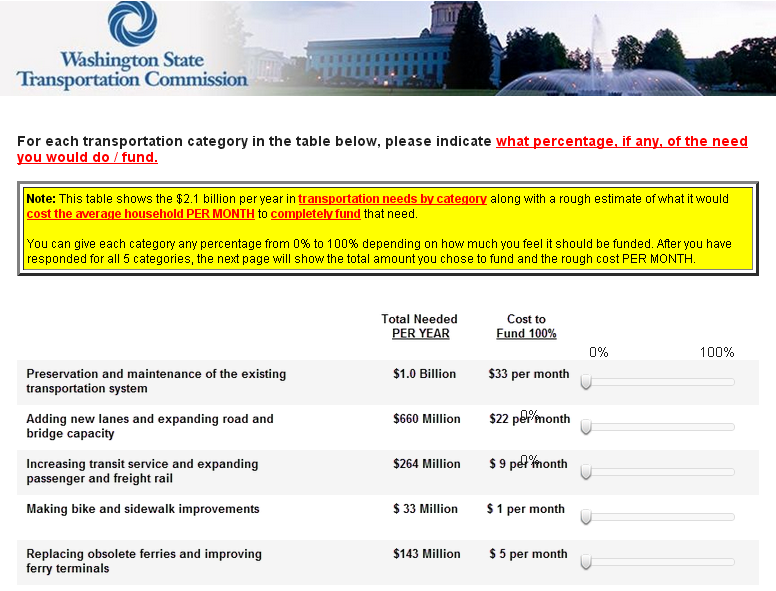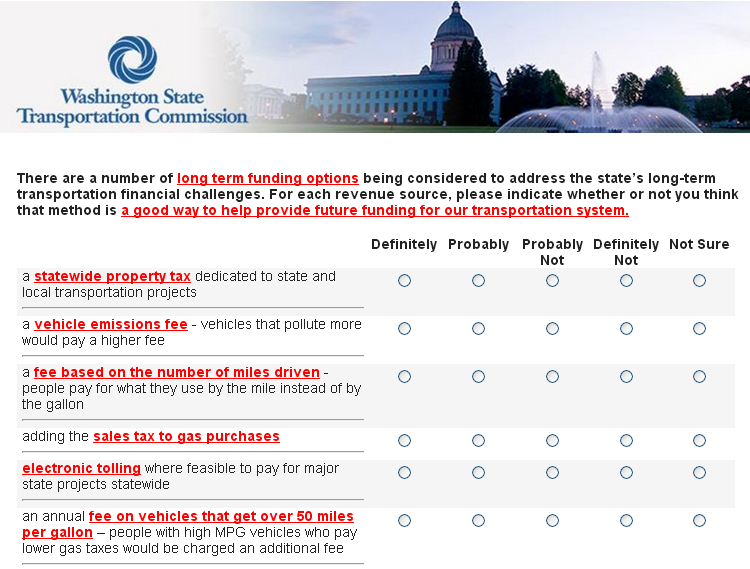
But out of curiosity we did a little dredging to find out what kind of “org” V.O.W.S. is. You see, the e-mail invitation said “voiceofwashingtonsurvey.org.” Something-dot-org usually stands for “organization.” WE checked the Secretary of State website and found that no such organization exists. So, what’s up with that?
It turned out that V.O.W.S. stands for “Voice of Washington State,” which is a government outreach effort “funded” by the Washington State Transportation Commission itself (meaning “with our tax dollars”). Our impression is that somebody dreamed-up this process to give narrowly-framed surveys a “community-input” look and feel. WE wonder how many people have participated in V.O.W.S. so far, and how proportionate responses are geographically. WE doubt many rural people will have their voices heard (like in the Methow Valley or other places far off the beaten path – the ones who use the most gas, and desperately need transportation). But it’s all-new, just launched in 2012, so there are no reports to see from the project, at least we couldn’t find anything online. Maybe this will be fair, but we expect it's intended to collect the opinions of city-folks and wherever big voting blocks are.
Getting back to the current V.O.W.S. survey, the choice being offered is pretty blunt. The basic theme is, “Would you like to pay more taxes and fees or get less service from the DOT?”
WE think that proposition sounds more like a threat or ultimatum than a “choice.” The agency seems to be saying, “Pay more, or else."
A premise, a question like this is very much like asking, “Would you like to pay more for your food or go hungry?” That's not a fair choice. It offers no reasonable option, like not going hungry by eating something cheaper, like a burger instead of a steak, or maybe a bowl of rice or cereal instead of that burger (veggie or otherwise).
The VOWS survey offered zilch in the way of alternatives to DOT's existing programs. It only asked how much more a person would be willing to pay, using various scales like this, with it's incoherent note and instructions:
In 2011-2013 the state transportation budget page shows that $111,500,000 (over $111 million) of DOT's operating expenditures were spent on public transportation while $429,700,000 was spent on highway maintenance and operations. That means about 25% of all operations money went to “public transportation.” WE're not aware of any statewide “public transit.” Truth is, the lion's share of transit money flows straight into county and city coffers. (To be fair, a few transit lines connect counties, but only in the more populated and urban areas.)
There are some other big-ticket items on the expenditure list that aren't related to state roads. You'll see $88,900,000 “paid to other agencies” (in the operations section), and in the capital expenditure section the page says $94,200,000 spent on “local programs.” That’s a huge amount of money ($88.9 million + $94.2 million = $183.1 million) going to things besides state highways and roads. Where does it go? It looks like a lot funnels into things like our nebulous "regional agency," Whatcom Council of Governments. See how much the state spends on rail ($29 million on rail operations + $426.4 on capital projects = $455.4 million total). Apparently a lot of that matching money helps “sustain” the mother of all fiscal trainwrecks, Amtrack. WE like trains, but wonder how efficient all that rail spending actually is.
You’ll find a “funding options” screen along the way:
WE think the survey should have asked, “Do you think the state’s spending your money on the right things?” at the very beginning. WE have serious doubts about the propriety of spending state transportation taxes on local transit and trails, and for "economic" and social engineering escapades for towns and cities like Complete Streets.
This is a pretty big state. It’s bigger than a lot of countries like Guatemala, Nicaragua, Greece, Nepal and Uruguay. Size-wise, at 71,300 square miles (that’s 184,666 square kilometers) Washington falls between Syria and Cambodia. We need state highways and roads to move freely between cities and counties. That's much more important than city transit.
Moving people and goods to work and to market, to facilitate the U.S. post, and for trucks to make deliveries to our homes is very high priority. But in the last twenty years or so, spenders have worked hard creating a “regional” approach to transportation that's a fig-leaf for spending on projects that honestly don't rise to statewide significance.
WE have low expectations that the situation will change on its own. Cities and counties where the big concentration of votes are love wallowing in the transportation pig trough. They claim they’re bringing home the bacon, bringing federal (and state) taxes back to us. But WE wonder, how much better would transportation be if the approach to spending was more rational? Think about the overlap in transportation missions with layers of duplicate paperwork wasted on local projects (state, county, and city). A lot of transportation work could be done faster, cheaper, and with a lot less confusion if jurisdictions took more direct responsibility for their own needs. The same work could still get done, and we might have a nickel in our pockets at the end of the day. How could the situation be improved?
We’ll cut to the chase. WE have a theory. Ready?
Federal transportation: WE think federal funds should be spent on national-scale projects, not state and local ones. National work would include the interstate highway system, airports that serve interstate and international traffic, and other projects that benefit the whole country (like work at border crossings, that would make sense).
State transportation: WE think state transportation money should be directed strictly to work that's legitimately state-scale, like state highways and roads (pa-leeze!), not for county roads or city streets, buses, or local street improvement projects, park trails, and so forth. Sound reasonable?
County transportation: WE think county transportation funds should be collected locally and spent on roads within a county that connect its towns and cities and to get us to the state and interstate roads. In rare cases, trails might be okay but only when the towns are close enough to make trails practical for walking and biking (or whatever). WE think recreation shouldn't be confused with transportation. And, lastly, county money shouldn’t be used to supplement city budgets. There was a time when our two biggest cities (Bellingham and Lynden) had their own bus systems. Then the WTA became a massive [whatever it is]. That wouldn't have happened without state and even federal funding. But that’s a topic for another post. Let’s just say for now that WE suggest the WTA has become a transportation sinkhole.
Lastly, Cities: They need to take direct responsibility for street and trail projects within their boundaries. The feds, state and the county constantly shovel money into cities. What’s amazing is how much money goes to city transportation projects here when our cities and towns are so tiny, transportation-wise. Check out the reality:
Bellingham’s area is 31.7 square miles, Lynden is 4.1 square miles, Ferndale is 6.3 square miles, Everson is 1.2 square miles, Sumas is 1.4 square miles, Nooksack is .7 square miles, Blaine is 8.5 square miles, and Birch Bay is a whopping 21.2 square miles.
Knowing what we do, we think this V.O.W.S. survey and the new transportation mind-set are seriously flawed, headed in the wrong direction. This is a huge state and on every level transportation priorities look out of whack. Here's a good article that was published in the Weekly Standard last year on this subject, "Interstate 2.0"
Take the VOWS survey if you're willing. Again, here’s the V.O.W.S. link Don't be shy - share your thoughts below too. Don't be afraid to disagree. This really is an open forum.



 RSS Feed
RSS Feed
